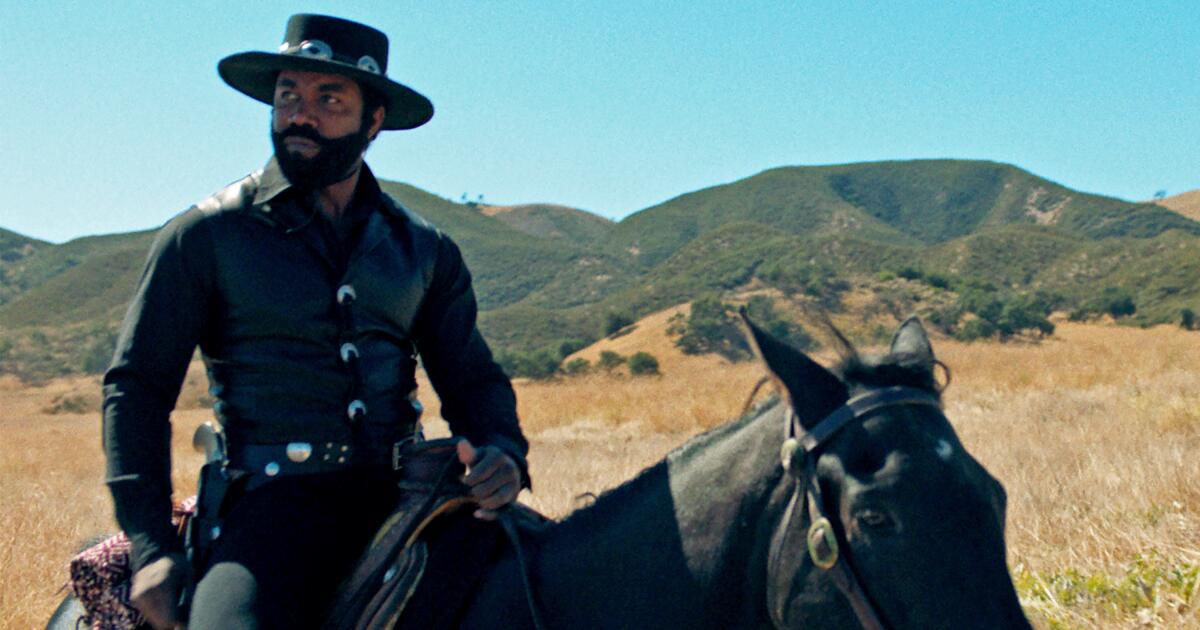
Where to begin with “Outlaw Johnny Black”? The newest genre flick from martial-arts icon and director-writer Michael Jai White, the Western action-comedy has been touted as the spiritual successor to White’s 2009 neo-Blaxploitation comedy, “Black Dynamite.” Originally an Indiegogo-backed production, the “Spawn” actor’s Western parody stars White as the title character, a quick, gun-slinging cowboy who has devoted his life to hunting down the man responsible for his father’s death. It is during this quest for vengeance that he becomes a wanted man and, left with no other choice, hides out in a small mining town where he poses as the new preacher.
Within “Outlaw Johnny Black”’s opening moments, White is quick to get to the action. In less than five minutes we’re given over to a showcase of his action chops, laden with a winking, tongue-in-cheek play with both the genre as well as his onscreen legacy. Snappy too are the bold opening credits which establish the film’s affection for the Western. However, it’s only too soon that things go astray from the kind of filmmaking that made “Black Dynamite” such a contemporary cult classic.
In as much as Westerns can be broadly defined by the seizure of land and territory by its protagonists, the inclusion of Indigenous communities in the genre has a less-than-stellar history. It’s an unwelcome surprise, then, that, just five minutes into White’s film, we’re introduced to the native characters of “Outlaw Johnny Black.” Clad in their party city best (cheap felt animal-skin approximations and what appears to be skinny scarves à la H&M circa 2007 tucked around their heads), it comes as a bit of a shock to be introduced to characters — including an actor who could be casually described as Aryan — portrayed in such a way.
Those of us who share an affection for White as well as biting satire might, at this point, be hoping for “Outlaw Johnny Black” to pivot into the beginning of a “Blazing Saddles”-esque critique of the genre, however problematic. Unfortunately, this turn never arrives. Bogged down by a blatant lack of self-awareness in regard to its humor, White clearly approaches his movies with good fun but never stops to ask for whom this fun is meant.
A scene from the movie “Outlaw Johnny Black.”
(Samuel Goldwyn Films)
Aided by a script that doesn’t have the smarts to carry off even offensive humor with any sort of sharpness, “Outlaw Johnny Black” is more akin to a revival of the mean-spirited humor of the 2000s which used certain communities and people as punching bags, all while trying to convince us that, in the end, we were all on the same side. Indeed, its hard to feel right about the movie’s penultimate action scene, which involves nearly everyone coming together to take on the film’s villain — when it is so many of these very same people who have been the butt of the joke for the film’s completely bloated two-hour runtime.
Between Russell Peters (a puzzling cameo as tribal chief) in a headdress crying a single tear while wearing a dangerously askew braided black wig, or jarring dashes of fatphobia, transmisogyny, and — why not? — “regular” misogyny, “Outlaw Johnny Black” doesn’t leave us much to root for and certainly doesn’t tender any goodwill. Any gags that are even halfway successful are promptly mined to death as the film continues to almost compulsively reach for them as the lowest of hanging fruit.
Overall, “Outlaw Johnny Black” mostly seems unsure of how to navigate its Monty Python-inspired parodic impulses alongside its clear reverence for the genre. Instead, White has offered a jumbled array of all-too-well-trod tropes and stereotypes that, all in all, can’t seem to hit the mark in terms of finding the sweet spot of being “so bad it’s good.” While its ramshackle editing could be unintentionally humorous, and the obvious dialogue almost veers toward the inadvertently enjoyable, it’s the movie’s insistence on punching down that renders it more of a nightmare than a fever dream.
‘Outlaw Johnny Black’
Rating: PG-13, for violence, strong language and some sexual material
Running time: 2 hours, 10 minutes
Playing: In limited release












